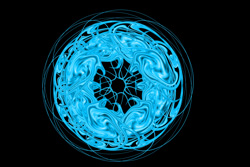Investigating quantum entanglement
The control of quantum systems shows increasing scientific interest and promises powerful applications and technologies. Entangled states of many particles deepen our understanding of fundamental aspects of the quantum world and its transition to the classical. To this end, the EU-funded ‘Entanglement for quantum information with ion strings’ (Entanglement 40CAQIP) project aimed to explore fundamental and practical aspects of multi-particle entanglement with strings of ions. Scientists developed large-scale multi-particle–entangled quantum states and investigated the coherence decay and transition to classical state. Beyond the coherence decay, scientists observed that multi-particle entanglement, when exposed to dissipative environments, yielded dynamical features and new classes of states and applications. As a solution to computation-generated errors, project members implemented multiple error correction cycles on their computing architecture and a quantum-feedback algorithm. A major achievement of the project was the development of a digital quantum simulator, capable of reproducing with high accuracy the dynamics of interactions. Entanglement 40CAQIP study results shed light on the territory of quantum entanglement and will hopefully prove beneficial to the majority of experimental systems using quantum computation and metrology.







